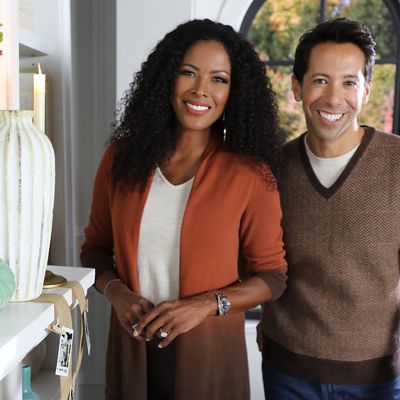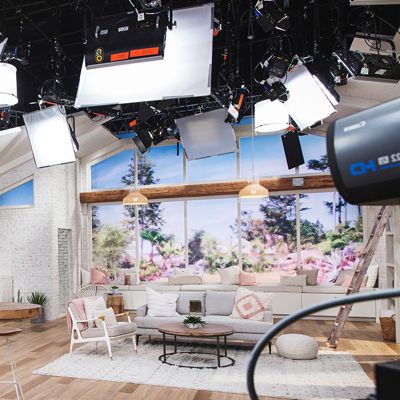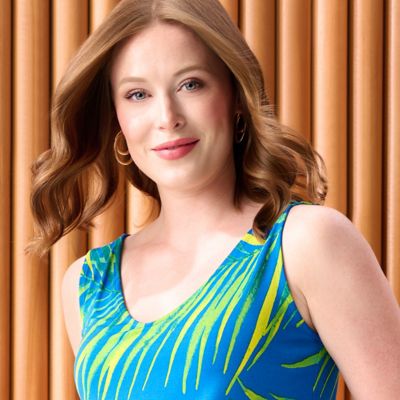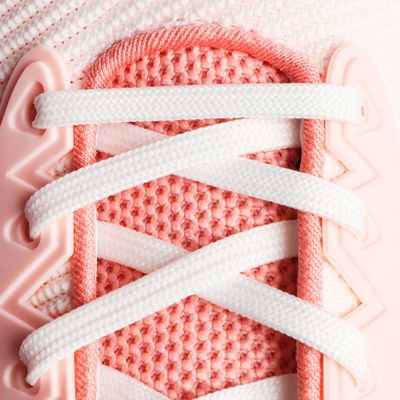This "tacky little dance band" from Georgia has everybody moving to a brand-new beat. But what makes them tick?
Since springing out of Athens, Georgia, in the mid-Seventies, the group has always been the quintessential party band. Songs like "Rock Lobster," "Dance This Mess Around" and "Love Shack" are indeed fun, thanks to singer Fred Schneider's hilarious recitatives, fellow vocalists Kate Pierson and Cindy Wilson's heaven-reaching harmonies, and the fusion of beach rock, Motown, girl groups, and ebulliently experimental jamming that Strickland and founding guitarist Ricky Wilson whipped up. They were improbable hit-makers, scoring Top Five singles and gold and platinum plaques while waving a flag for gay pride and singing the silliest lyrics possible. "Why don't you dance with me? I'm not no limburger," goes "Dance This Mess Around," while "Rock Lobster" finds Pierson and Cindy going full Yoko Ono while making up sounds for jellyfish, narwhal, sea robins and bikini whales.
This summer, the B-52's will be celebrating their history on tour, both solo and as part of a package with Culture Club and the Thompson Twins. Although the lineup has changed over the years – Ricky died of AIDS in 1985, shaking the band to its core, and Strickland retired from the road in 2012 – they've never lost the party spirit that defined the group when it was straddling punk and New Wave in the early Eighties. They haven't put out an album since 2008's Funplex (and likely won't do another) but they know what their fans want from a B-52's concert.
"We just have to play 'Rock Lobster' and 'Love Shack,' 'Planet Claire' and 'Roam,'" the perennially redheaded Pierson says. "For our own benefit, we've added [Bouncing Off the Satellites'] 'Wig' to the lineup, and we've never had so much fun playing that. Sometimes that's a song people don't know as well, but people seem to really enjoy it."
Ahead of the tour, the four surviving B-52's took some time to reflect on the wild times that fueled their early success with Rolling Stone. Here's an oral history of how the band, which formed after a night of drinking "flaming volcanos" at an Athens Chinese joint in 1976, took off.
Early Days – "Athens Used to Hold a Record for Streaking."
Keith Strickland:
Ricky and I had known each other since high school. When I met him, he had a 4-track tape recorder and had already recorded some songs just on guitar. They were amazing. He'd learned folk guitar. Then he and I started playing together. When we got more serious, I moved to drums.
Kate Pierson: Fred and Keith used to get stoned and do poetry and play. And I had been in a band in high school, and Cindy was singing with Ricky. So we all had sort of played with each other. One night we just started jamming after going out and drinking these flaming-volcano drinks, and that became the template of the band. Most of our songs came from jamming together.
Fred Schneider: We liked all music: James Brown, Motown, the Velvet Underground, Yoko Ono, the Beatles, Perez Prado mambo – we played everything, especially anything to dance to. Our goal, I guess, was to be a dance band, so we didn't really have ballads in the beginning.
Strickland: We were listening to really campy sci-fi soundtracks. Fred is a vinyl collector. He'd find these great, old records. Ricky and I were really into Captain Beefheart. We also loved Joni Mitchell. You wouldn't hear it, but she was a big influence on us, at least in terms of open tunings and the harmonies and chords she'd use. Our feeling was if it sounds good, it is good. So we put that freedom into writing. We felt like we could do anything.
Pierson: The inspiration for our vocal harmonies was sort of Appalachian. It's sort of at weird intervals and it almost has an Appalachian kind of feel to it. The harmonies were really spontaneous. And the way we jammed, we would just get into a trance. Almost like automatic writing, this collective unconscious would take over and sometimes we'd be singing all at once. We'd listen back to the tape and seek out the best parts and patch them together in a collage. I might be doing the high part and Cindy does the low part, but then we would switch. On "Roam," we crossed over in the highs and lows.
Cindy Wilson: Ricky and I were living together at one point after he came back from hitchhiking all around Europe. We were working at a luncheonette counter [laughs]. I came to work one day, and Ricky was playing music on his guitar, just snickering. He played me the riff that turned out to be "Rock Lobster," and it was hilarious. He was just trying to be funny. His guitar style made it moodier and it really is a driving song, but it does have that funny humor to it.
Schneider: I went to this disco in Atlanta called the 2001 Disco. Instead of a light show, they had pictures of puppies, babies, hamburgers and lobsters on a grill. And I thought, "Rock Lobster," that's a good idea for a song and probably no one else would." I told everyone I had the idea, and we started jamming on it. The lyrics got weirder and weirder. I used to live on the Jersey shore, because I'm from New Jersey, so you would constantly hear "Pass the butter, please" on the radio, which was tanning butter [laughs]. I would do that and the gals came up with those wild fish noises. Cindy let loose with her tribute to Yoko.
Wilson: We tried to have these song paintings. It took a lot of work and a lot of rehearsal, because we weren't reading music. It was very intricate. There were a lot of stops and starts and changes and weird harmonies that we came up with. When we do the shows, it sounds like we're just having fun, but it really is labor intensive.
Strickland: We'd listen back and pick out different vocal parts for Kate and Cindy, and the lyrics they were singing. Ricky and I would write the music, and then Fred, Kate and Cindy would jam on top if it and we would record it. Then we'd piece it together.
Schneider: We would jam for hours. It would sometimes take a month or two to come up with a song. We'd record everything on reel, and Kate and Ricky would take them home and go through it and pick out parts. That's why "Rock Lobster" was originally six minutes and 47 seconds long.
Pierson: I remember being in the house me and Cindy had rented in Athens and working on that song and "Planet Claire" and just jamming on fish sounds. Little did we know that the song would have the life and spark it had. That's one of my favorite songs to perform, because we can still experiment. We can still jam on it live. It's very spontaneous.
Strickland: Fred told his friend, Julia, that we had a band – and we didn't really have a band yet – but she was having a Valentine's Day party, and she said we could play at her party.
Pierson: There weren't really places to play in Athens, so we had to play a party. There was a folk club, and it was kind of hippie music. The clubs were just emerging. We were just sort of an aloof group of artistically oriented friends, and we would crash parties together and drink beer and dance really crazy. We'd usually drive people off the dance floor [laughs].

Strickland: There were a lot of really wild parties in Athens when we first started.
Wilson: Athens used to hold a record for streaking back in the Seventies. It was craziness.
Strickland: The wildest party I remember was where a friend of ours had one in his basement apartment and put about a foot or maybe half a foot of popcorn on the floor. It was really dark, and he put black plastic on all the walls and there was a black light. I remember at one point, everybody got naked and put oil on their bodies and rolling around in the popcorn [laughs]. It was just naked, oily bodies and popcorn listening to Captain Beefheart. A friend of ours was a filmmaker and filmed everything.
Pierson: I remember one time where people were streaking. Our friend came to the party wearing nothing but a barrel. She was naked, but had a barrel around her and our friend Jeremy came to present her, and he had a cape on. I got a garden hose and took it into the house. I must have had a few tequilas under my belt, and I sprayed around the house. It was a rental, but I don't think it did too much damage.
Strickland: When we played the Valentine's party, we were doing a different kind of music from the stuff everyone listened to – R&B like James Brown; Junior Walker and the All Stars; Earth, Wind & Fire – but it still had a backbeat. So we played this party and our friends loved it. We had so few songs that when we were done, they said, "Well, play them again." We just repeated it all the way through and everybody kept dancing. We thought it's pretty good if our friends liked it, because they'd be the first to say, "You suck."
Pierson: We had to borrow the sound system. We placed it on a bookshelf. It was in this little house, and it shook. We wore these fake fur wigs that I found; it was this crazy pocket book made of fake fur and we turned them upside down. They were white, and made white Afros. Cindy and I wore those and we wore black and had some Barbie dolls on the ceiling. Keith wore this little red wig he dyed. We had five or six songs. I know we did "Planet Claire, "Devil in My Car," "52 Girls," "Rock Lobster," "Lava" and maybe "Strobe Light." Our friends loved it so much. They just danced so hard. The speakers were just rocking.
Schneider: At the time, we had a song called "Killer Bees," because killer bees had just arrived in South America. After day one, the killer bees invaded the Western hemisphere. And then the next gig was at an old, Jewish recreation center. The third party we did was on top of a table at a friend's house.
Wilson: I'm now living across from the second party we played, in this big house. It was just a bunch of college kids living there, and it retains the same vibe.
Strickland: Kate wasn't really playing keyboard yet. So at the first few parties, Ricky and I made a backing track that we played along to.
Pierson: We recorded it on reel to reel.
Strickland: So the tape had some conga, maybe some bass tones from the Farfisa organ and some second guitar; that we could play guitar with it and I played the congas. I wasn't even playing drums.
Schneider: We all had jobs we didn't like in the beginning. At the time, I was the mail delivery coordinator. Ricky worked at the bus station. Cindy worked at the Whirly-Q luncheonette. Kate worked at a local rag [the Athens Banner Herald]. So it was a hobby. We had to save up money to play anywhere.
Strickland: We started the band just to entertain ourselves. We weren't thinking of having a career 40 years later.
The B-52's Take New York – "We Forgot to Even Ask if They Wanted Us Back"
Wilson: One time Ricky and Keith said, "We should just go and be street musicians in New York and live over there." It kept going. I remember Ricky going to the library at the university and studying what he could do, like how to develop a portfolio and make a 45.
Strickland: We had some friends in Atlanta who played in a band. They started playing New York at CBGBs and said, "You guys should play New York."
Pierson: We sent a tape up there and CBGBs said no, but Max's Kansas City said sure. So we drove up from Georgia, and it was like a 20-hour drive. We had this car we called Croydon, Cindy and Ricky's parents' station wagon. We'd stopped playing along with the tape by then.
Schneider: We were paralyzed with fear, because we had never played before anybody except our friends. I think only 17 people showed up. It was a Monday night in December, and I think two of the Cramps were there, Lux and Ivy. The curtain didn't open, so I had to throw it open and all the other bands were dressed in black and we were like a rainbow congregation. We forgot to even ask if they wanted us back.
Pierson: On the first night, we didn't have many songs. We didn't realize it was kind of an audition night, and there were a lot of other bands on the bill. They asked us to cut the set short. We drove all the way from Georgia, and they said, "Can you play a couple of songs?" We played like 20 minutes or something and immediately left the stage. We put our stuff in the station wagon and drove straight back. But they called us and said they wanted us back.
Strickland: We were listening to the Talking Heads, Patti Smith, the Ramones and, of course, the Sex Pistols at the time. We didn't really consider ourselves punk, but we knew that we were going to be a part of that. We didn't really call ourselves "New Wave." I remember we got called that when we started playing the clubs in New York for bands like us and the Cramps, because people were moving a little bit away from the punk thing and were just making songs [laughs].

Pierson: We blazed the path between Athens and New York for months. Each time we'd come back, we'd write more songs, rehearse like crazy and go back up. At one point, CBGBs said, "You can't play both here and Max's." Then we started playing the Mudd Club and the Loft. I remember at the Loft, there was a huge line outside and Ricky looked out the window and said, "What's that line out there?" We didn't have any idea that the line around the block was for us. The place was so jammed and crowded. Ricky drank a lot because he was very nervous and shy. He was not gonna be able to play but [after he drank] he was on fire. He played great.
Strickland: So this thing was happening in New York and we were in the right place at the right time. A friend of ours, Danny Beard, created a label called DB Recs and we recorded our first single for him – "Rock Lobster" and the B side was "52 Girls" – and that sold really well, like 20,000 copies. So the labels got interested in us.
Pierson: We'd had a friend, who was our first manager, and she started getting offers from Red Star Records, and Virgin and Warner Bros. were interested. And she said, "Y'all, I don't know what to do." So we met our manager, Gary Kurfirst, through Tina [Weymouth] and Chris [Frantz] from the Talking Heads. He brokered the deal for us with Warner Bros. and Island Records.
Strickland: Our manager used to play that we were shy and he would do all the talking. We were rather quiet then. We're all introverts except for Kate; Fred sometimes can be very shy. But when we get up onstage, we just go for it.
Wilson: I was shy, but Ricky was even shyer, until he got to know you. I think the music helps you get out of yourself.
Schneider: In the beginning Ricky would turn around onstage a lot. The band sort of looked at me to be the frontman, so I would tell bad jokes or I started a thing where I would get the audience to do a call-and-response thing. We became more outgoing over time. Plus, we smoked pot [laughs]. That might have made us a little paranoid.
Pierson: We probably kept our mouths shut because we didn't really know the music business. We thought, "It's better to just not say much." I don't think we were shy so much as we were terrified. Especially when we did Saturday Night Live on live TV. We looked really animatronic because we were scared, but it came off as being this alien sort of attitude, which served us well, because people were like, "Whoa, this is so weird." But we were just shy and terrified.
Schneider: Saturday Night Live was nerve-racking. I was so sick to my stomach, but it went really well, and it put our record back on the charts. Eventually, it went platinum.
Finding the Love Shack – "When You Opened the Door, It Was a Wild Band Playing"
Wilson: When Ricky passed [in 1985], it was just a horrible time. It was like an atom bomb going off. I think Keith dealt with the shock by doing music every day. That was his way of getting over his depression.
Strickland: After about two years, I told Cindy and Kate I had some music I had been working on and played it for them and then we started discussing the potential of working together again. And then we called Fred and said, "Do you want to do it?" He said, "Sure."
Wilson: We got a rehearsal space in Manhattan in the Wall Street area. We were very serious about it. We would work for four days a week, and it came together pretty quickly. It was all about nostalgia. It was looking back at the good times we used to have in Athens, so it was a wonderful, healing record.
Schneider: The music became a little more funk, I guess. We wrote much faster.
Pierson: Keith would write the instrumentation and we would jam on that. We'd all get together and pick out parts and paste them together, then we would learn the parts. Sometimes we'd just play acoustic guitar and try out the parts and make a library. We'd use a double cassette player and make little edits.
Strickland: It took about a year to write Cosmic Thing. We spent a lot of time just talking, and we needed that. We were our own support group after Ricky's passing, which was a very traumatic thing for all of us and, in particular, for Cindy.
Wilson: It turned out to be such a healing thing to get back together again. It felt like Ricky was in the room.
Schneider: I had the idea for "Love Shack." There was a place outside of Athens called the Hawaiian Ha-Le. It was an African-American club that had a lot of good shows. It looked like a shack, you wouldn't expect it to be what it was, and when you opened the door, it was a wild band playing.
Wilson: It used to be this funky building with a tin roof that was old and rusty. They would have Soul Train lines. They just put a condemned sign on it, so it's closed down.
Strickland: The funny thing about "Love Shack" is that we had decided what songs we wanted to do when we were meeting producers. We had already decided we were going to work with Nile Rodgers and Don Was. We played Don Was our demos, and he said, "Do you have anything else?" I said, "Well, we have this one other song, but it's not finished."
Pierson: We actually had a whole different version of it, and I remember Keith saying, "It's not ready to put on the record." Fred and I were like, "No, it's gonna be a hit. We love it."
Strickland: We almost didn't play it for him, but we did and it was still rambling. Don said, "This is great. Just repeat this one part." The part was, "The love shack is a little old place where we can get together ... love shack, baby." That had occurred only once in the original structure. So as soon as he picked that out, we thought, "That's the chorus." It's like, "Voila." It almost didn't happen [laughs].
Pierson: That Motown feel really made it a party anthem, a regular hit at all your weddings and bar mitzvahs. It's just got his infectious beat and you can't help but dance to it.
Strickland: Another funny thing is we were recording the song at Bearsville Studios in Woodstock, and there was a big electrical storm outside, and all the electricity went out. We were like, "No, no, no." When we listened back, we had an awesome take, but it was only halfway done but it got cut off in the breakdown, kind of over a dropout. So we just picked it up right there and took the rest from a second tape. That song is all live except for one splice. We didn't know if it was a hit when we finished it, but we felt there was something special about it.
Pierson: The radio [programmers] weren't really enthusiastic about the song. Fred worked a lot of the indie stations promoting it, Loretta Lynn–style, like "My record is in the garbage can." Then college radio really embraced it. Thank God for college radio.
Strickland: There was something magical about that album, how it all came together. We sequenced it in a way that we felt told a story. I don't know if anybody's ever noticed it, but one song leads into the other in a nice way. It tells a story from beginning to end.
Pierson: Time sort of evaporated after that album.

More Good Stuff – "It's Just Fun to Do"
Strickland: Cindy had left the band after Cosmic Thing, and we were burnt out from so much touring but we had to write another album quickly. Our manager at the time pushed us. We toured a lot for that album [Good Stuff] and after that, I was exhausted. I'm not sure if Kate and Fred felt the same way, but I know they wanted to take a break. And the break lasted a little bit longer and it kept lasting longer and longer. We tried to write again a couple of times, but it wasn't working.
Pierson: When we did Funplex, and people said it's been 16 years, we were like, "What? Really?" Because we've been together 40 years and never stopped. I remember Chrissie Hynde saying our bands never quit and reunited, and there should be some kind of award for that [laughs].
Strickland: I quit touring in 2012. I was just over traveling on the road. I'd been doing it for 35 years, so I stopped the year I turned 60. I just wanted to get in the studio and work on music. I've been more interested in that than performing anyway since Ricky passed.
Schneider: Now we have someone who can play Keith's parts really well. Tracy Wormworth has been with us since the "Love Shack" days. We're lucky now in that nobody in the band wants to leave. We treat it like a family.
Wilson: I miss having Keith in the group, but I get to look over at Fred and Kate and the rest of the band and it's a lot of fun. I'm still amazed about these people, and it's just fun to do.
Pierson: I don't really see us doing another record. I'm hoping we can do another song. When we did Funplex in Atlanta, we all had to fly in and stay in hotel rooms. It was much more expensive than it used to be. You have to be super committed to do a whole record. We were really happy with that record, and it really came together and we loved it, but it's just hard to get together to do that.
Schneider: We all have solo projects. It would be too hard for all of us to get together, too. Cindy's in Georgia. Kate's in upstate New York. I'm way out on Long Island. If anything, we'd do a live album. Maybe an album with a symphony. That would be great.
Strickland: I'm making music mostly for myself these days. The band hasn't really discussed doing anything new. I have a lot of stuff, but I don't have any plans for any solo things. What I'm doing now is very electronic.
Wilson: I did a solo album, Change, that came out in December, and I've been doing some touring with that. Then I get to change hats and wigs and do the B-52's. It's the best of both worlds.

























